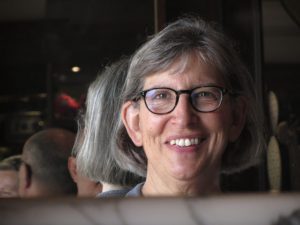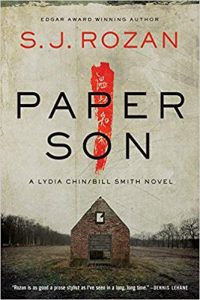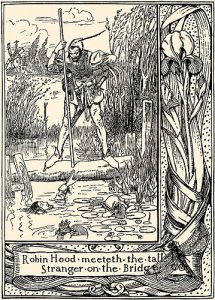
SJ Rozan is the author of the Lydia Chin/Bill Smith books. Unusual in fiction, the series switches narrators from book to book, giving Rozan’s long running private eye series not only a unique hook but a fresh take on each story she tells. Set mainly in New York, the new and long awaited installment in this series is set in Mississippi. Despite the radical change in setting, it’s still very much a Lydia and Bill story, and readers should expect a very welcome return to Lydia and Bill’s world. Paper Son is out July 2 and can be pre-ordered on the website.
Robin Agnew: It’s been a long wait for the return of Lydia and Bill. I know you were writing novellas in the interim, what else have you been up to?
SJ Rozan: Those Sam Cabots weren’t novellas, they were full-length novels. My writing partner, Carlos Dews, and I were hoping to keep that series going, and to slowly bring in every paranormal creature in the planet under the same big-paranormal-bang umbrella. However, as often happens to grand plans, practicalities interfered. The publisher folded the imprint, and that was that. I move on then to write a thriller set in Mongolia — THE XANADU KEY — which has not yet found a publisher. I also did a number of short stories which I had contracted and which were stacked up on the runway. After that I went back to Lydia and Bill, whom I had put aside because I didn’t have a good idea for a new book and I wasn’t going to be one of those series writers who phoned it in. Then I got a good idea.
Robin: The new book takes Lydia to, of all places, Mississippi. Why did you choose Mississippi, and did you visit the state for research?
 SJ Rozan: It worked the other way. I was visiting the Mississippi Delta when the good idea hit me — practically clobbered me over the head. The friend I’d gone to see took me to the Chinese cemetery in Greenville. I asked, The Mississippi Delta had enough of a Chinese population for a cemetery? Why yes, he answered. You know, the grocers. I did not know. What grocers? After he explained, and I did a lot of research here in NYC, I went back to the Delta twice more. As a rule I don’t write about places I haven’t been. I need to know how the streets feel under my feet, how the air smells… Things Google can’t tell you.
SJ Rozan: It worked the other way. I was visiting the Mississippi Delta when the good idea hit me — practically clobbered me over the head. The friend I’d gone to see took me to the Chinese cemetery in Greenville. I asked, The Mississippi Delta had enough of a Chinese population for a cemetery? Why yes, he answered. You know, the grocers. I did not know. What grocers? After he explained, and I did a lot of research here in NYC, I went back to the Delta twice more. As a rule I don’t write about places I haven’t been. I need to know how the streets feel under my feet, how the air smells… Things Google can’t tell you.
Robin: If you did visit, how do you get the atmosphere and feel of a place unfamiliar to you to feel right to the reader – and hopefully, of course, to someone from Mississippi?
SJ Rozan: The colors of the vegetation, the shapes of the buildings, the tempo of people’s lives, the food and drink, the sounds and smells of each place, and, especially, the rhythms and vocabulary of speech — these are what make places different from each other. Finding, recording, and using these elements are a large part of the joy of writing a book, for me.
Robin: Your book naturally touches on racism in the south, but while that’s an issue in the south AND in the north, I think maybe in the south it just takes a different form. Can you talk about that a bit? You present some very nuanced points of view in the new book.
SJ Rozan: In Mississippi, just about everything’s about race. Yes, this country has race issues everywhere; but few places take it to as bizarre extremes as Mississippi has in its past and is continuing to in many ways in the present. The Chinese in Mississippi were seen as being between black and white — they were certainly, to the white Mississippian, “colored,” but not black, which confused their identity in the white mind. This fact presented a great opportunity to talk about race, racism, and perception.
Robin: Your series has long been a favorite of mine, and one of the reasons is that you change narrators from book to book, which I think keeps your series fresh. What kind of mindset or attitude to you have to have when you’re writing about Lydia, and what is different for you when Bill is the narrator?
SJ Rozan: This sounds disingenuous, I’m sure, but depending on whose head I’m in, the mindset comes naturally. When I sit down to write I see the world through the eyes of the narrating character. That view provides the language, the rhythm, and to some extent even the subject matter. The book I’m working on now is a Bill Smith book. Its opening sentence is, “Shifting colors on a monster billboard bled through the mist, showed me a shadow in the alley.” Lydia would never say that.
Robin: Private Eye novels are one of the great contributions American writers have made to fiction, not just mystery fiction. Right now, the P.I. novel doesn’t seem quite as robust as it has in the past. Agree? Disagree? Why is it important to you as a genre? You are certainly helping to keep it vital.
SJ Rozan: The PI is an iconic character — one with her/his own resolute code of honor, living by choice on the edge of society’s conventional lines. This position can be a lonely one, but it also offers the PI the chance to see clearly and to comment on inequities in the way we live. The view is often a dark one but it’s a voice we need.
How robust the genre is in any given decade has more to do with the fickle hearts of publishers than with writers’ aspirations or readers’ wishes. The PI will be ever with us.
Robin: What gets you excited to sit down and write every day? I know writing is a disciplined job, but it’s also a creative one, so what in particular gets you fired up?
SJ Rozan: I love to use words. Like a cabinetmaker with saw and sandpaper, I love this craft. I also love to watch the story I’m trying to tell as it unfolds. I don’t outline, so seeing the pieces fall into place is kind of thrilling. Though many a time they fall into the wrong place and I have to go back and try to see what happened and what needs to happen instead. That process holds its own excitement, too.
Robin: What book was a transformative read for you, as a reader or a writer? What book set you on your present path?
 SJ Rozan: Howard Pyle’s ROBIN HOOD. As I reached the second-to-last chapter I was stricken to realize that I was close to the point where there wouldn’t be any more. Then I thought maybe I’d go to the library and see if Mr. Pyle had written any more, maybe a second volume. I was a little kid but I knew about volumes; I had no idea what the word actually meant, but I knew it meant more books. On my way to the library I wondered, if Mr. Pyle hadn’t written any more Robin Hood stories, maybe someone else had? And from there it was a short step to, Hey, I could! And thus a writer was born.
SJ Rozan: Howard Pyle’s ROBIN HOOD. As I reached the second-to-last chapter I was stricken to realize that I was close to the point where there wouldn’t be any more. Then I thought maybe I’d go to the library and see if Mr. Pyle had written any more, maybe a second volume. I was a little kid but I knew about volumes; I had no idea what the word actually meant, but I knew it meant more books. On my way to the library I wondered, if Mr. Pyle hadn’t written any more Robin Hood stories, maybe someone else had? And from there it was a short step to, Hey, I could! And thus a writer was born.
Robin: Will Lydia and Bill be returning after PAPER SON? And if so, where are they headed? Back to New York?
SJ Rozan: Yes, and yes. New York, another take (after GHOST HERO) on the art world. Bill Smith narrates the story of a painter who’s terrified he might be a serial killer, and hires Smith to prove that he isn’t — or, that he is.
Robin: Finally, do you have a favorite character you’ve created throughout the series? Lots of people (myself included) love Lydia’s mother.
SJ Rozan: I get a kick out of Lydia’s mother, too, and am up to six short stories narrated by her; when I have enough I’ll do a collection. But all the characters I create are real to me, and some of them stick around longer than others. I miss them all when a book’s over and they’re gone.